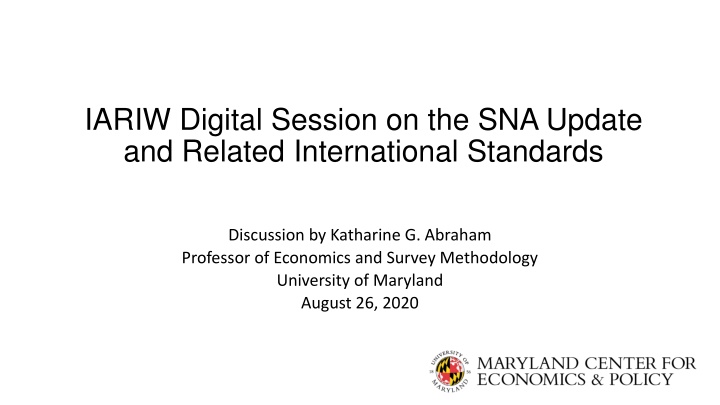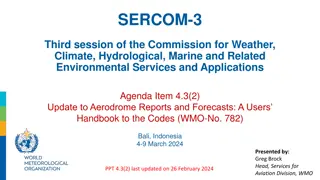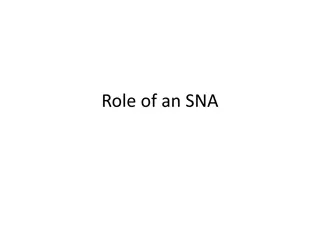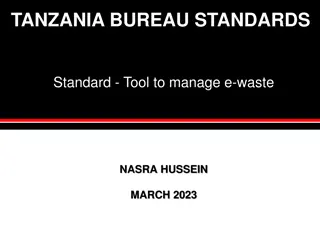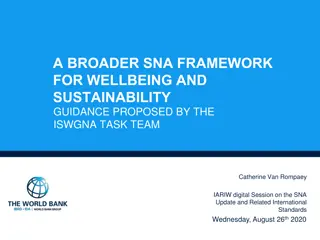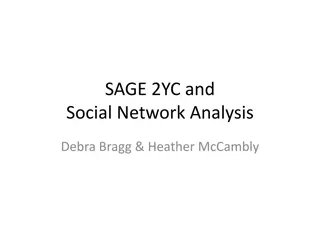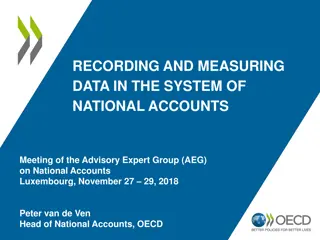IARIW Digital Session on SNA Update and Related International Standards Discussion
Scope of project discussed in the session covers extended accounting in various areas such as household income distribution, education, health, and environmental-economic aspects. User perspectives highlight the importance of extended accounts in informing policy decisions, assessing productivity, well-being, and sustainability. Key questions raised include income distribution trends, impact of tax systems, home vs. market care, medical spending outcomes, human capital investments, and natural resource depletion.
Download Presentation

Please find below an Image/Link to download the presentation.
The content on the website is provided AS IS for your information and personal use only. It may not be sold, licensed, or shared on other websites without obtaining consent from the author.If you encounter any issues during the download, it is possible that the publisher has removed the file from their server.
You are allowed to download the files provided on this website for personal or commercial use, subject to the condition that they are used lawfully. All files are the property of their respective owners.
The content on the website is provided AS IS for your information and personal use only. It may not be sold, licensed, or shared on other websites without obtaining consent from the author.
E N D
Presentation Transcript
IARIW Digital Session on the SNA Update and Related International Standards Discussion by Katharine G. Abraham Professor of Economics and Survey Methodology University of Maryland August 26, 2020
Scope of project described in session is broad Papers discuss extended accounting in five areas Distribution of household income, consumption, saving and wealth Unpaid household service work Labour, education and human capital Health and social conditions Environmental-economic accounting Offer guidance for development of extended accounts and for integration between extended accounts and the SNA Much more in the papers than I can discuss!
User perspective on extended accounts National accounts exist to inform policy and other decisions Multiple goals for extended accounts Better measures of output and productivity Better measures of investment in productive capacity Better basis for assessing well being Better basis for assessing sustainability As extended accounts developed, would urge that questions most relevant to decision makers guide methods and priorities
User perspective on extended accounts (contd) Some key questions extended accounts could help to answer: To what extent has the share of pre-tax and pre-transfer resources flowing to those at the top of the income distribution grown? How have the tax and transfer systems affected that share? (distributional account) To what extent does informal care provided in the home supplement paid care provided through the market? (home production, health accounts) Has growing medical care spending led to commensurate improvements in the outcomes that are realized? (health account) To what extent have investments in human capital added to nations productive capacities? (human capital account) Are natural resources being depleted at a faster pace than they are being replenished? (environmental account)
Roles for SNA versus extended accounts Agree with perspective articulated in the papers that SNA should not be disrupted Distributional accounts can exist alongside the aggregate accounts Would not want to include extended output measured in home production, human capital, health, or environmental accounts in GDP or NDP Nonmarket output large relative to that captured in market transactions Absent market prices, cannot value it precisely Data necessary for measurement unlikely to be available at a quarterly frequency Appreciate paper s recommendations for consistency in classification and treatment of overlapping items between the SNA and expanded accounts where possible
Building extended accounts that will be used Goal should be to publish extended accounts on a regular schedule using a consistent methodology Regular schedule need not be quarterly or even annual; for some purposes, publication every few years or even less frequently should be sufficient In many cases, too early to settle on specific methodologies Surprised there was not more emphasis in the papers on the use of double entry bookkeeping in the extended accounts where possible Importance of reconciling input-based and output-based measures of household services mentioned in framework paper (p. 14) Also an issue for human capital and health accounts Double-entry bookkeeping important for the credibility of the traditional accounts and where feasible could contribute to the credibility of the extended accounts Terminology may matter ( extended accounts rather than satellite accounts ), but secondary to substance for new accounts legitimacy
Some additional thoughts Data availability will be an important driver of progress in the development of extended accounts Concerned about ability of statistical agencies to collect time use and other survey data as inputs to the extended accounts Household survey response rates continue to fall, forcing statistical agencies to explore other means of data collection For some accounts, may be possible to repurpose data already collected for administrative and other purposes (e.g., education, health) Transparency central to the credibility of the extended accounts Documenting methods necessary but not sufficient Also important to be clear about sensitivity of estimates to specific choices
Distributional accounts Area group paper provides thoughtful commentary on several important issues Construction of equivalence scales Treatment of insurance premiums and lottery ticket purchases Treatment of anticipated social security benefits in the measurement of wealth Particular interest in distribution of income and wealth by percentile groups Household the appropriate unit of observation for defining equivalent income Would like percentiles to be defined to include same number of people, not same number of households Statistics on distribution of income in a given year may not answer the question policy makers care about Life cycle factors important (earnings tend to be low early and late in life) Statistics that account for changes in age distribution likely to be more meaningful Cyclical and other short-term shocks cause annual incomes to vary Consider reporting both one year and three year statistics
Health accounts Area group paper addresses important questions regarding the production boundary for the traditional and extended accounts One interesting contrast between the SHA and the SNA is that the SHA counts household care services for which the provider receives a dependency allowance Means that measured output could jump or fall with changes in government policy Would not adopt that approach in the SNA Strongly agree with recommendation that production boundary in an extended health account should encompass all unpaid household health and long-term social care services Even recognizing current lack of consensus on how to measure it, accounting for quality of health care is absolutely central Effects on life years and quality of life seem most important, but speed of access to treatment and patient experience also may be relevant Although quality adjustment ultimately belongs in the SNA, given current lack of consensus, sensible to start first with the extended accounts
Environmental accounts In addition to discussing issues specific to environmental accounting, the area group paper makes the case more generally for focusing in the SNA on NDP rather than GDP Conceptually this seems right, but necessary data on consumption of fixed capital often rest on weak foundations In the United States, for example, the Bureau of Economic Analysis still uses information from studies conducted in the late 1970s and early 1980s to construct depreciation estimates Problems compounded with regard to intangible capital Moving from a focus on GDP to NDP would need to be accompanied by an investment in stronger measures of capital and capital consumption
Reference Katharine G. Abraham and Christopher Mackie, eds. 2005. Beyond the Market: Designing Nonmarket Accounts for the United States, Washington, DC: National Academies Press.
